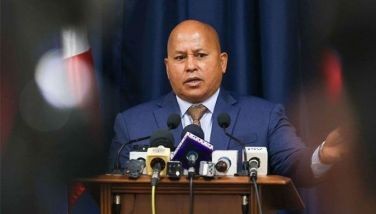ME labor deployment drops 15%
February 24, 2003 | 12:00am
The number of Filipinos leaving the country to work in the Middle East in January dropped by 15.7 percent compared to the same month last year, according to records of the Philippine Overseas Employment Administration (POEA).
From Jan. 1 to 22, POEA recorded a total of 5,333 newly hired overseas Filipino workers (OFWs) in the Middle East, 15.7 percent less than the total of 6,326 registered newly hired workers in the region a year ago.
Among the countries in the Middle East, Egypt recorded the biggest decline at 66.67 percent, followed by Israel with 56.63 percent, then Lebanon at 29.03 percent and Saudi Arabia with 24.11 percent.
Kuwait, which borders Iraq, posted a 10.38 percent increase in the number of newly hired workers during the same period.
Bahrain, Oman and Yemen also hired new OFWs.
Total overall deployment of OFWs in the first month of the year went down by six percent from 98,589 workers hired in January 2002 to 93,005 OFWs.
Earlier, Labor Secretary Patricia Sto. Tomas reported that several countries in the Middle East experienced a slowdown in the hiring of foreign workers, including Filipinos, because of tension in the region due to the impending war between Iraq and the United States.
Sto. Tomas expressed confidence that the slowdown will only be temporary, since most countries in the region still prefer to hire skilled Filipino workers over those of other nationalities.
Department of Labor and Employment information and public service director Nikon Fameronag said that representatives of agencies hiring workers for duty free shops in the Middle East came to the Philippines recently to hire new OFWs.
"The newly recruited OFWs will probably be deployed to the Middle East by March," Fameronag said.
From Jan. 1 to 22, POEA recorded a total of 5,333 newly hired overseas Filipino workers (OFWs) in the Middle East, 15.7 percent less than the total of 6,326 registered newly hired workers in the region a year ago.
Among the countries in the Middle East, Egypt recorded the biggest decline at 66.67 percent, followed by Israel with 56.63 percent, then Lebanon at 29.03 percent and Saudi Arabia with 24.11 percent.
Kuwait, which borders Iraq, posted a 10.38 percent increase in the number of newly hired workers during the same period.
Bahrain, Oman and Yemen also hired new OFWs.
Total overall deployment of OFWs in the first month of the year went down by six percent from 98,589 workers hired in January 2002 to 93,005 OFWs.
Earlier, Labor Secretary Patricia Sto. Tomas reported that several countries in the Middle East experienced a slowdown in the hiring of foreign workers, including Filipinos, because of tension in the region due to the impending war between Iraq and the United States.
Sto. Tomas expressed confidence that the slowdown will only be temporary, since most countries in the region still prefer to hire skilled Filipino workers over those of other nationalities.
Department of Labor and Employment information and public service director Nikon Fameronag said that representatives of agencies hiring workers for duty free shops in the Middle East came to the Philippines recently to hire new OFWs.
"The newly recruited OFWs will probably be deployed to the Middle East by March," Fameronag said.
BrandSpace Articles
<
>
- Latest
- Trending
Trending
Latest
Trending
Latest
Recommended































